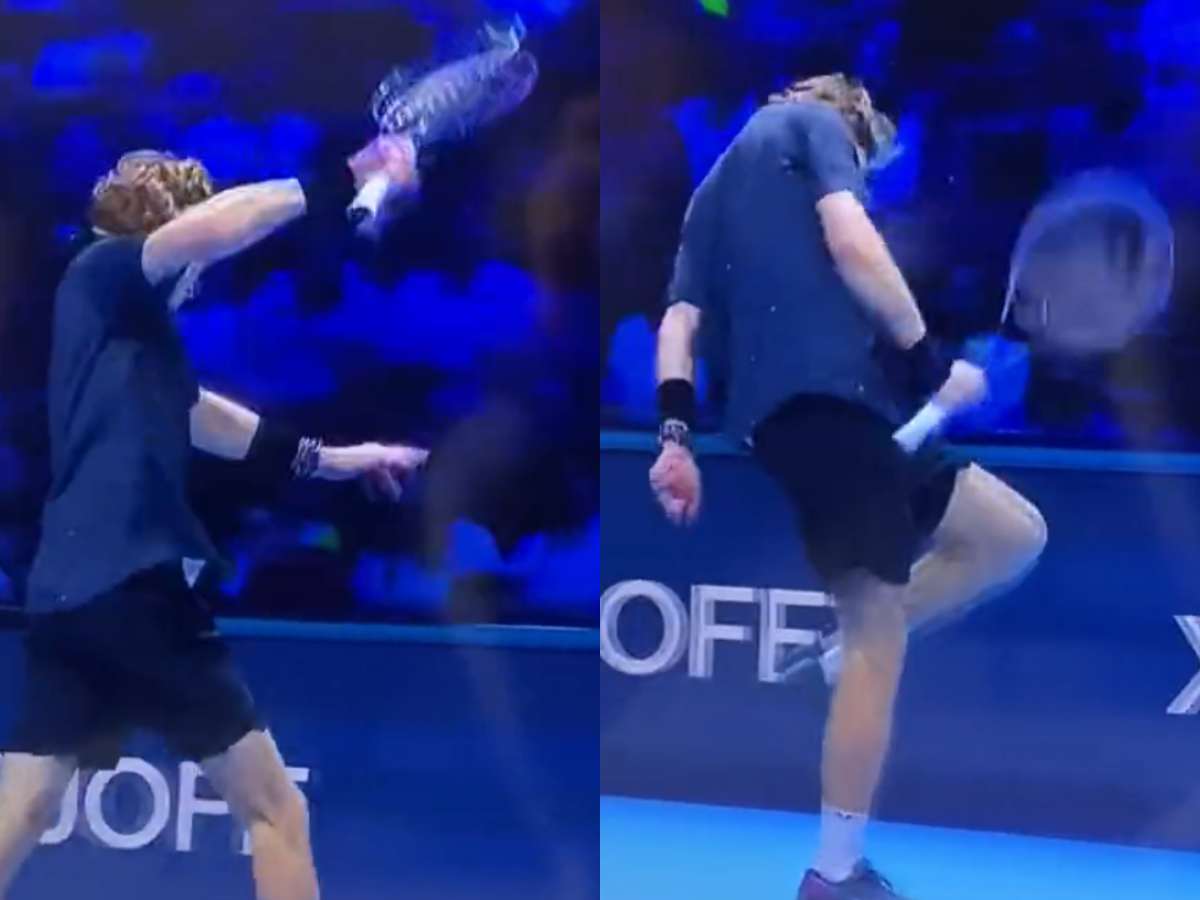Why Does Rublev Hurt Himself? Unpacking Athlete Frustration And Public Perception
Watching top athletes perform can be truly captivating, can't it? We see moments of sheer brilliance, incredible skill, and often, too it's almost, intense emotional displays. These powerful reactions on the court or field sometimes leave us wondering about the reasons behind them. Why do certain players show such strong feelings, sometimes appearing to harm themselves or their equipment?
It’s a question that, you know, comes up a lot when we watch competitive sports. We might see a player smash a racket, or yell out, or show visible distress. This kind of action, like when people ask, why is it that you have to get going, really makes us curious about what’s going on inside. What pressures are these individuals dealing with, and how do they manage the sheer intensity of their professional lives?
The question, "Why does Rublev hurt himself?", really gets at something deeper than just one player's actions. It prompts us to think about the broader picture of athlete well-being and the incredible demands placed upon them. As a matter of fact, it invites us to explore the common reasons behind such public expressions of frustration in the high-stakes world of professional sports.
- Brandon Coleman Red Clay Strays Bio
- Amy Yasbeck
- Madison Anderson
- Kristi Noem Husband Occupation
- Is Pam Bondi Married To Greg Henderson
Table of Contents
- The Intense World of Professional Sports
- Why Do Athletes Show Such Strong Emotions?
- Understanding "Hurting Themselves": Beyond the Obvious
- The Mind's Game: Psychological Factors at Play
- Pressure Cooker Moments: When Emotions Boil Over
- How Athletes Might Find Balance
- The Public Eye and Athlete Behavior
- Frequently Asked Questions (FAQs)
- Looking Ahead: Understanding Athlete Behavior
The Intense World of Professional Sports
Professional sports, especially tennis, are a bit like a constant, very public test. Every match brings high stakes, and every point can feel like a huge moment. Players are under constant pressure to perform at their very best, nearly all the time. This pressure comes not just from opponents, but also from coaches, sponsors, fans, and, of course, from within themselves.
The demand for perfection is, arguably, quite strong. Athletes train for years, honing their skills to a fine point. One small mistake can cost them a match, a tournament, or even a ranking. This kind of environment can be incredibly draining, both physically and mentally. It’s a bit like being under a microscope, with every action and reaction seen by many.
Think about the travel, the rigorous training schedules, and the constant competition. It’s a life that asks for a lot, and, in some respects, gives a lot back, but it also takes a significant toll. This relentless pace means athletes are always pushing their limits, and that can lead to feelings of stress and exhaustion.
Why Do Athletes Show Such Strong Emotions?
So, why do we see these powerful emotional displays from athletes? Well, a big part of it is the sheer competitive drive. These individuals are built to win, and that desire runs very deep. When things don't go their way, or when they feel they're not meeting their own high standards, that drive can turn into visible frustration.
Frustration with performance is a common trigger. Imagine practicing a shot thousands of times, only for it to fail at a crucial moment. That feeling of disappointment can be overwhelming. It’s like when someone asks, "Why is 'c*nt' so much more derogatory in the us than the uk?"—it's about the underlying intensity of the feeling and how it's expressed.
The weight of expectations, too, is a heavy burden. Fans expect wins, media expects stories, and athletes themselves often expect nothing less than excellence. This internal and external pressure can build up, and sometimes, the only way it finds release is through an outward burst of emotion. Physical and mental exhaustion also play a role. When a player is tired, their ability to control their feelings might be lessened, making them more prone to emotional outbursts.
Understanding "Hurting Themselves": Beyond the Obvious
When people ask, "Why does Rublev hurt himself?", they are often referring to visible actions like smashing a racket, hitting a net, or shouting in frustration. It's important to understand that, in most cases, these actions are not literal self-harm in the way one might think of it. Instead, they are often a way of expressing extreme anger or disappointment, often directed at their own performance or a perceived unfairness.
These displays can be a form of release, a way to let out intense, pent-up feelings in a high-pressure situation. For example, a racket might be seen as an extension of their performance, and breaking it could be a symbolic act of breaking free from the frustration of a missed shot. It’s a bit like how the word "pussy" is used to mean coward; the connection isn't literal, but symbolic, reflecting an intense feeling.
The perception of these actions versus the reality is key. To an observer, it might look like a player is "hurting themselves" or being self-destructive. However, for the athlete, it might be a momentary outburst that, in their mind, helps them reset or express a feeling that feels too big to hold inside. It’s a complex human reaction to extreme pressure, not always a sign of deeper, harmful intent.
The Mind's Game: Psychological Factors at Play
The mental side of sports is, basically, just as important as the physical. Many athletes have a strong drive for perfection. They set incredibly high standards for themselves, and when they don't meet those standards, the disappointment can be very intense. This perfectionism, in a way, can lead to a lot of self-criticism and frustration.
Coping mechanisms are another important aspect. Some athletes have learned healthy ways to deal with stress and frustration, like taking a deep breath or talking to their coach. Others, however, might not have developed these tools as effectively, or they might be overwhelmed in the moment. This can lead to less helpful ways of coping, like lashing out.
Past experiences can also play a role. A player who has faced tough losses or struggled with certain aspects of their game might carry that history with them onto the court. This can make them more sensitive to setbacks, and, as a matter of fact, more prone to emotional reactions when things go wrong. The internal voice, or self-talk, is also very powerful. Negative self-talk can amplify feelings of anger and frustration, making a bad situation feel even worse.
Pressure Cooker Moments: When Emotions Boil Over
Certain moments in a match are, like, practically designed to make emotions run high. A missed easy shot, a bad line call, or a sudden shift in momentum can instantly change the mood of a player. These are the pressure cooker moments where feelings can boil over very quickly. It’s in these instances that we often see the most intense reactions.
The immediate aftermath of mistakes is a particularly vulnerable time. A player might feel a surge of regret or anger right after making an error, especially if it feels unforced or costly. This immediate emotional hit can be hard to process, and sometimes, the reaction is an instant, visible outburst. It’s a bit like the reason why power drops occur when a buzzer is activated; it's a sudden, strong reaction to a trigger.
The feeling of losing control, too, can be incredibly unsettling for an athlete. They spend so much time trying to control every aspect of their game, from their serve to their footwork. When they feel like they’re losing control of the match, or even their own performance, it can be deeply frustrating. This sense of helplessness can often lead to outward displays of anger or despair, as a way to cope with that feeling.
How Athletes Might Find Balance
Finding balance in such a demanding environment is, actually, a huge challenge for athletes. Mental conditioning plays a big part. This involves training the mind just as much as the body, helping players develop strategies to manage stress, stay focused, and bounce back from setbacks. It’s about building mental toughness, but also emotional resilience.
Support systems are also incredibly important. Coaches, trainers, and sports psychologists can provide invaluable help. They can teach techniques for emotional regulation, like mindfulness or visualization, and offer a safe space for athletes to talk about their feelings. Having someone to guide them through the emotional ups and downs can make a significant difference.
Learning emotional regulation is a continuous process. It’s not something that happens overnight, but rather a skill that develops over time with practice and guidance. This involves recognizing when emotions are starting to build, and then using learned techniques to manage them before they become overwhelming. It’s about understanding the "why" behind their own reactions, much like understanding why a word starts with a 'y' sound but takes 'a' instead of 'an'.
The Public Eye and Athlete Behavior
Athletes are, obviously, very much in the public eye. Every move they make, every reaction they have, is watched by millions. This intense scrutiny means that their emotional displays are not just personal moments; they become public spectacles. Fans react in many different ways, some with understanding, others with criticism.
The responsibility of public figures is, in some respects, quite heavy. They are often seen as role models, and their behavior can influence many people, especially younger fans. This awareness can add another layer of pressure, making it even harder to manage intense emotions in the heat of the moment. It’s a constant balancing act between being authentic and being a public example.
The broader conversation around athlete mental well-being has, thankfully, grown in recent years. There's a greater understanding that athletes are human beings with feelings and struggles, just like anyone else. This shift helps to create a more supportive environment, where seeking help for emotional challenges is seen as a strength, not a weakness. It encourages us to look beyond just the actions and consider the person behind them.
Frequently Asked Questions (FAQs)
Here are some common questions people ask about athletes and their emotional displays:
Why do athletes get so angry during games?
Athletes often get very angry during games because of the intense competitive drive they possess, combined with the high stakes of performance. This anger can stem from personal frustration over mistakes, perceived unfairness, or the immense pressure to win. It's a natural, albeit sometimes intense, human reaction to a demanding situation.
How do professional athletes manage their emotions under pressure?
Professional athletes use a variety of ways to manage their emotions under pressure. Many work with sports psychologists to develop coping strategies, such as deep breathing, positive self-talk, or visualization. They also rely on their training and experience to stay focused, even when things get tough. It's a skill they practice regularly, just like their physical game.
Is it normal for athletes to show so much frustration?
Showing frustration is, in a way, quite normal for athletes, especially in high-intensity sports. While the degree of expression varies from person to person, the underlying feelings of disappointment or anger are common. It reflects the passion and dedication they have for their sport. What's considered "normal" can also vary depending on the sport's culture and the individual's personality.
Looking Ahead: Understanding Athlete Behavior
So, when we ask, "Why does Rublev hurt himself?", we're really opening up a broader conversation about the human side of professional sports. It’s a chance to consider the immense pressures athletes face and the very real emotional challenges that come with being at the top of their game. Understanding these pressures helps us appreciate their efforts even more, and, as a matter of fact, encourages a more thoughtful response to their public displays.
It’s about moving beyond just seeing the action and trying to grasp the underlying reasons. Just like when people wonder about the strange origins of modern words, understanding the 'why' behind an athlete's actions gives us a richer picture. We can, you know, learn more about athlete well-being on our site, and also find more insights on the psychology of competition here.
Let's try to approach these moments with a bit more empathy and curiosity. Instead of quick judgment, we can, basically, consider the complex mix of factors that lead to such powerful expressions. The world of sports is, truly, a fascinating place, full of incredible skill and very human emotion.
- Keegan Bradley Wiki
- Many Summer Later Gravity Falls
- Lela Sohna Nude
- Did Laura Ingraham Get Married
- Andre Jin

"Why does no one talk about Andrey Rublev’s behavior, it's really disturbing" - Fans react to

Rublev Explains Why He Hits Himself With Racquet Instead Of Court

WATCH: Andrey Rublev continues self harm as he hits himself with racket amid struggle against